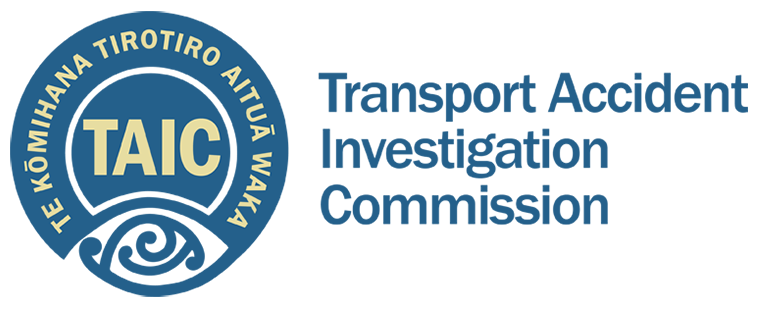Transparency Statement
This transparency statement is published in accordance with the Standards for Information Gathering and Public Trust, issued by the State Services Commission. It explains why and how the Commission collects, uses, and shares information gathered (directly or indirectly) about members of the public or other entities.
TAIC’s principal purpose is to determine the circumstances and causes of certain aviation, rail, and maritime accidents and incidents, with a view to avoiding similar occurrences in the future, rather than to ascribe blame to any person.
Legislation
TAIC acts in accordance with its powers under the Transport Accident Investigation Commission Act 1990 (the TAIC Act), and its obligations under the State Services Commission’s Code of Conduct, the Privacy Act 1993, the Official Information Act 1982, and the Public Records Act 2005. All records are held securely.
Information gathering
TAIC gathers information for the purposes of an inquiry or in support of the inquiry process. This includes physical evidence at the site of an accident or incident, and information from personal interviews, documents, and digital sources.
TAIC receives most personal information directly from the person concerned. However, sometimes a person may provide TAIC with information about someone else.
TAIC has no law enforcement or regulatory compliance responsibilities, so TAIC gathers no information for these purposes.
Confidentiality
The TAIC Act gives strong confidentiality protections to the information we gather when it is for the purpose of an investigation. TAIC may only use information collected under the provisions of the TAIC Act for the inquiry process. It is an offence for inquiry information to be disclosed except in accordance with the Act.
If a Commission report refers to an individual, it is by their role and not by name.
The TAIC website has further information about TAIC’s inquiry processes: taic.org.nz/how-we-work.
TAIC and the Official Information Act 1982
The Official Information Act 1982 (OIA) enables people in New Zealand to request information from government organisations, such as TAIC. Its overarching principle is that information shall be made available unless there is good reason for withholding it. It balances the interests of public participation in open, transparent, and accountable government with competing public interests in the protection of information in certain circumstances.
TAIC is open and transparent about its inquiry processes, policies, guidelines, and procedures, and it responds to all official information requests according to the OIA. It is often necessary for TAIC to withhold official information due to the provisions of Part 3 of the Transport Accident Investigation Commission Act 1990 (the TAIC Act ). The TAIC Act protects from release information about the Commission’s investigations, including under the Official Information Act 1982. See section 14R TAIC Act.
The confidentiality of investigation information protects the strong interest in public safety that underpins the Commission’s investigations. When considering the release of information, TAIC also considers protection of privacy, the need to ensure continued supply of confidential information, and compliance with New Zealand’s international obligations.
When dealing with official information requests, TAIC will be:
- Helpful: Provide all reasonable assistance to the requestor, where needed;
- Prompt: Respond to requests and release information as soon as reasonably practicable, within the requirements of the OIA;
- Transparent: Provide explanations for any refusal to release information;
- Straight: Operate a ‘no surprises’ approach, including notifying Ministers, other agencies, or next of kin about requests and the release of information, as appropriate
Responses to commonly-made OIA are available in the blue Document Downloads box on the right-hand side of this page.
Cockpit voice recordings
TAIC cannot and does not release cockpit voice recordings or transcripts of CVRs. Disclosure is prohibited under s14C of the TAIC Act, other than in accordance with the accident investigation (and report) or by order of the High Court. These provisions reflect New Zealand’s obligations under Annex 13 of the International Civil Aviation Organisation Convention [.pdf 285Kb] and the high public interest in ensuring CVR information is available to transport safety investigation agencies.
Kia Toipoto compliance
Kia Toipoto - Public Service Pay Gaps Action Plan 2021–24 is a set of actions to help close gender, Māori, Pacific and ethnic pay gaps in the New Zealand Public Service.
TAIC's Equity Action Plan 2025 is available for download from the blue panel to the right of this page.
NB: TAIC does not publish data about pay gaps (if any). This is because TAIC, with only around thirty employees, does not have enough employees (who are women, Māori, Pacific or other ethnicity) for the information to be statistically robust and protect employee privacy.
Briefings to Ministers
List of briefing papers sent to the offices of Ministers
| Month | Number | primary/ copied Minister/s | paper ref |
Date sent to office |
Title of paper |
| Nov 2024 | 1 | Hon Doocey | n/a | 13/11/24 | TAIC Annual Report 2023-24 |
| Oct 2024 | 1 | Hon Doocey | n/a | 7/10/2024 | Status update on TAIC safety recommendations – Report from the transport sector on activity for 1 July 2023 to 30 June 2024 |
| Sep 2024 | No papers | ||||
| Aug 2024 | No papers | ||||
| Jul 2024 | No papers | ||||
| Jun 2024 | 1 | Hon Doocey | n/a | 24/06/2024 | TAIC half year report |
Questions and raising an issue
If you have any questions about our information gathering and holding activities, or believe TAIC has not acted in accordance with its transparency statement or other obligations, you can contact us at the following address:
Transport Accident Investigation Commission
PO Box 10 323
Wellington 6143
New Zealand
Or complete the online form at: taic.org.nz/contact-us (please use the drop-down menu to indicate the nature of your communication)
Where information requests are refused, the requestor may ask for the decision to be reviewed by the Ombudsman.

